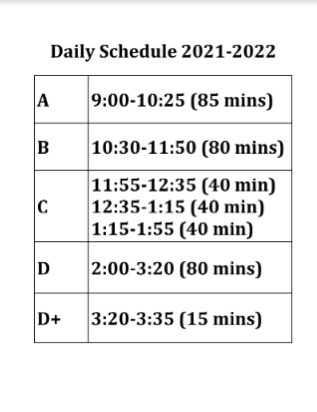Should We Start School Later?

January 12, 2023
On a cold winter morning, as the moon faintly illuminates the snow that covers this town, nearly a thousand students and teachers are startled awake. Their phone alarm goes off, their mothers desperately knock on the door as a school bus idles outside. This reality repeats itself 180 times a year, as the tired masses are made to begin their day in the confines of Ludlow High at exactly 7:25 am.
Does it have to be this way? Should it be this way? Our school schedule seems to be locked in stone. Yes, the periods may shift and change over the years, but one constant has been that high school classes begin promptly at twenty-five past seven. Some may suggest that since this time has been around so long, it works. “If it ain’t broke, don’t fix it,” as the saying goes. But this system is broken.
Teens need sleep
When a teen goes to the doctor, one of the most common recommendations they may make is to get more sleep. And this is exactly right. According to Nationwide Children’s Hospital, teens should get between nine and nine and a half hours of sleep. But most teens only get about seven hours of sleep. There are many reasons why teens get so little sleep. For one, a teen’s internal clock, which determines when someone feels sleepy or awake, shifts two hours later after puberty. That means, for example, someone who fell asleep at nine o’clock as a child now will fall asleep at eleven o’clock. That also means they will wake up naturally two hours later than before.
Therefore, one would conclude that teens should go to school later than elementary school children since they naturally wake up later. But this is not the case in schools across the country, including Ludlow, which start around seven, while elementary school children head to school at nine. This, combined with after-school activities such as sports, homework, and socializing which, while important, also force teens to stay up later, means that “most adolescents are very sleep deprived.” This has negative implications on mood, behavior, cognitive ability, and academic performance, and could even lead to car accidents due to drowsy driving.
Is it possible to open school later?
You may read about how terrible early school openings can be for teens’ health. But feel that the status quo is the only way forward, with after-school sports and events requiring an early dismissal, and thus an early start to the day. But some schools, including one in Western Massachusetts, have found a way to make a healthy start time work. Beginning last school year, the Amherst-Pelham Regional School District “flipped” their school start times. Now, elementary schools start after eight in the morning while middle and high schools don’t start until at least eight forty-five. In a statement announcing the decision, the district cited broad support across the community for the move, including 81% of parents, 72% of teachers, and 60% of students. The superintendent, Michael Morris claimed that later start times “contribute to better outcomes in a variety of areas, including academics and overall well-being.”
The new system also means that school lets out later. In Amherst, high schoolers now don’t leave school until 3:35. Many worry that having school end this late would lead to a loss of athletic and after-school opportunities for students. While it’s hard to tell the full effect that the schedule change had, especially since it came in the middle of the pandemic, Amherst does still offer a full suite of varsity sports and plenty of clubs. The school wouldn’t offer these activities unless they were confident students, staff, and coaches could stay later to take part in them. Amherst has shown that later start times are possible while maintaining the high school experience.
Do we want to?
Back in Ludlow, people have mixed opinions on changing the school schedule. Senior Anthony Costa thanks that moving to an Amherst-style schedule “would be great.” But he concedes that he thinks students wouldn’t “actually get more sleep.”
No matter what the schedule looks like, one thing students can try to control is their sleep. Getting as much sleep as possible during the school year is a surefire way to not only raise grades but have a better quality of life. So next time you don’t feel like getting out of bed, don’t feel too bad when you hit the snooze button.


Brendan Duffy • Jan 14, 2023 at 11:34 pm
Great article! The school start times are a hazard that remains ignored by adults in charge. Yet when teens crash or suffer depression or suicide, they wonder if there was anything they could have done that just might have helped avoid these unfortunate outcomes ! – – Brendan Duffy – Certified Sleep Educator